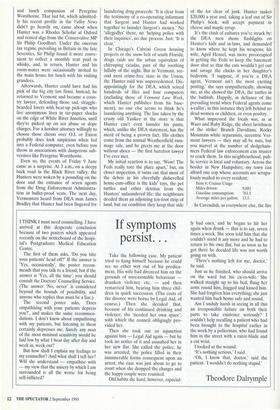If symptoms
persist. . .
I THINK I must need counselling. I have arrived at this desperate conclusion because of two posters which appeared recently on the noticeboard of the hospi- tal's Postgraduate Medical Education Centre.
The first of them asks, `Do you bite your patients' head off?' If the answer is 'Yes, occasionally', the poster recom- mends that you talk to a friend; but if the answer is 'Yes, all the time', you should consult the Doctors' Counselling Service. (The answer 'No, never' is considered beyond the bounds of possibility, and anyone who replies thus must be a liar.) The second poster asks, 'Does empathising with your patients depress you?', and makes the same recommen- dations. I don't know about empathising with my patients, but listening to them certainly depresses me. Surely any man of the most minimal sensitivity would be laid low by what I hear day after day and week in, week out?
But how shall I explain my feelings to my counsellor? And what shall I tell her? Will she understand — empathise with — my view that the misery by which I am surrounded is all the worse for being self-inflicted? Take the following case. My patient tried to hang himself because he could see no other way out of his predica- ment. His wife had divorced him on the grounds of unreasonable behaviour — drunken violence etc. — and then remarried him, bearing him three chil- dren in quick succession. (The costs of the divorce were borne by Legal Aid, of course.) Then she decided that, because of his continued drinking and violence, she 'needed her own space', with which the council obligingly pro- vided her.
Then she took out an injunction against him — Legal Aid again — but he took no notice of it and assaulted her in her new flat. She called the police, he was arrested, the police filled in their innumerable forms consequent upon an arrest, the case was just about to go to court when she dropped the charges and the happy couple were reunited.
Old habits die hard, however, especial- ly bad ones, and he began to hit her again when drunk — that is to say, seven times a week. She soon told him that she couldn't stand it any more and he had to return to his own flat; but as soon as he got there he decided life was not worth going on with.
'There's nothing left for me, doctor,' he said.
Just as he finished, who should arrive on the ward but his ex-ex-wife. She walked straight up to his bed, flung her arms round him, hugged and kissed him. She had forgiven him everything; she just wanted him back home safe and sound.
Am I unduly harsh in seeing in all this an irresponsible failure on both their parts to take existence seriously? I couldn't help recalling a patient who had been brought to the hospital earlier in the week by a policeman, who had found him in the street with a razor-blade and a cut wrist.
I looked at the wound.
'It's nothing serious,' I said.
'Oh, I know that, doctor,' said the patient. 'I wouldn't do nothing stupid.'
Theodore Dalrymple


















































 Previous page
Previous page